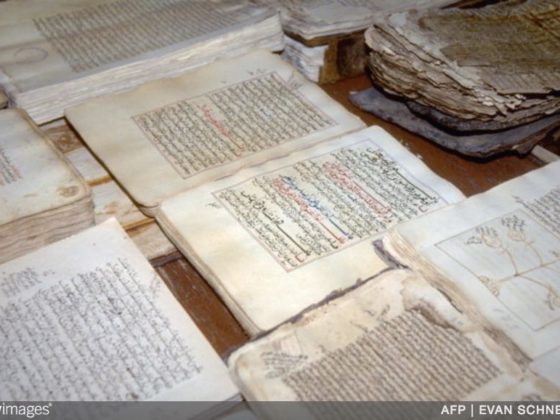THE WORLD’S CULTURE AND HERITAGE HAS always been protected by an unlikely group of people: librarians. Back before the internet, libraries were the place where knowledge was kept. And prior to the printing press, that knowledge had to be written directly onto paper. Because making copies would have been an infinitely more laborious process, fewer copies existed, meaning that it was much easier for knowledge to be totally lost if, say, the library was burnt down or if a document were misplaced. So the position of librarian was an incredibly important one.

How "Badass Librarians" Saved Timbuktu's Priceless Books From Terrorists
Today, we think of librarians less as defenders of human culture, and more as a middle-aged woman shushing children. But their original function remains. Case in point: the badass librarians of Timbuktu who saved priceless manuscripts from marauding terrorists.
The story is covered in Joshua Hammer’s new book, The Bad-Ass Librarians of Timbuktu: And Their Race to Save the World’s Most Precious Manuscripts, and it covers the events following the fall of Muammar Qaddafi’s regime in Libya in 2012.
After the Arab Spring, many jihadists were able to get their hands on Libyan weapons. They took the weapons and invaded Northern Mali, instituting a sharia regime in Timbuktu. Timbuktu is an ancient capital, and was once a great intellectual center in West Africa. It housed many ancient and priceless manuscripts that, for one reason or another, would have been targeted by Islamic fundamentalists, and likely would have been destroyed.
As the jihadists, acting under the group Al Qaeda in the Islamic Magreb, started to destroy Sufi shrines and cultural artifacts that were deemed to be heretical, a Timbuktu librarian named Abdel Kader Haidara began smuggling the artifacts out of the city. Haidara was the perfect man for the job — he had been given the task decades earlier of going out and finding as many of these manuscripts as possible. It had been a difficult job, as many were held in remote villages or by private families, but Haidara had eventually amassed 377,000 manuscripts.
The librarians smuggled all of those manuscripts out of the city, little by little, in donkey carts and cars, in boats and in taxis, 600 miles over the desert to Mali’s capital of Bamako in the South. The books are still being held in Bamako, where Haidara says he’ll keep them until things calm down in Timbuktu. In the meantime, he’s digitizing them and preserving them so that, if Bamako were ever to fall to the jihadists, the knowledge preserved in those manuscripts would be safe.
Via National Geographic. You can buy Hammer’s book here.